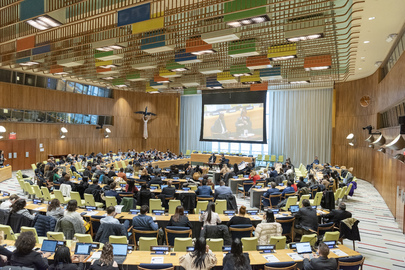Afghanistan: 4 years since ban on girls’ secondary education began
In Afghanistan, it has been four years since the ban on secondary education for girls came into force. The UN fully supports the universal call for it to be lifted.
At the time of the prohibition, girls like Fatima Amiri were the target of violent extremists, determined to drive them away from school and learning.
She was 17 when a suicide bomber blew himself up in her classroom in Kabul, killing more than 50 of her friends and leaving her with lifechanging injuries.
Today, she’s an advocate for Afghan girls who are desperate for their schools to reopen, as she’s been telling UN News:
“I’m in touch with lots of girls in Afghanistan. They are sending me their voice, crying, they are sending me many messages and saying that we want the right that is education. They are in a very bad situation; they are in depression. They [are] lost…the only thing they had it was education, but right now they do not have it. Some of them are saying that we were studying and it was our hope that we will create our future and we will make our future better and we will make our country a better place for us. But now we do not have this right, we do not have our basic rights.”
According to UN Women, more than nine in 10 Afghans support their right to go to school.
Multiple UN agencies and partners including Education Cannot Wait have urged the global community to unite in support of education for all girls there.
Increase in medical professionals migrating hits healthcare back home
A warning now from the UN World Health Organization (WHO) that southern and eastern European countries are losing large numbers of doctors and nurses who are leaving to work abroad.
A new UN health agency report also shows that in Europe in 2023, six in 10 medics trained outside the region, while the number is even higher for nurses.
In light of these findings – and the fact that many western and northern European countries are becoming “heavily dependent” on these foreign workers – the WHO is calling for fairer and more sustainable health worker migration.
WHO’s Dr Natasha Azzopardi-Muscat said that every migrating doctor or nurse leaves a “strain on families and on the national health systems they left behind.”
By 2030, Europe is expected to have a shortfall of almost one million health workers, the UN agency said.
It noted that Romania has managed to reduce the number of doctors leaving the country in recent years, from 1,500 to 461, mainly by offering better pay, training and working conditions.
‘Innovation index’ shows Switzerland in lead as China makes the top 10
Switzerland, Sweden, the United States, the Republic of Korea and Singapore are the world’s most innovative countries.
That’s according to UN agency the World Intellectual Property Organization, WIPO, whose Global Innovation Index 2025 shows that the UK, Finland, the Netherlands and Denmark are also in the top 10 – along with China for the first time.
In other findings, WIPO said that growth in innovation investments is slowing, “clouding” future forecasts about intellectual property trends.
Around 80 indicators are used for the UN report, ranging from spending on research and development, venture capital deals, hi-tech exports and intellectual property filings.
The latest WIPO report shows that middle-income economies led by China, India (38th) and Türkiye (43rd) – have continued to climb the innovation ladder by turning ideas into reality.
In the last five years, though, it’s Saudi Arabia (46th), Qatar (48th), Brazil (52nd), Mauritius (53rd), Bahrain (62nd) and Jordan (65th), that have made the fastest progress.
Daniel Johnson, UN News
Source of original article: United Nations (news.un.org). Photo credit: UN. The content of this article does not necessarily reflect the views or opinion of Global Diaspora News (www.globaldiasporanews.com).
To submit your press release: (https://www.globaldiasporanews.com/pr).
To advertise on Global Diaspora News: (www.globaldiasporanews.com/ads).
Sign up to Global Diaspora News newsletter (https://www.globaldiasporanews.com/newsletter/) to start receiving updates and opportunities directly in your email inbox for free.
































